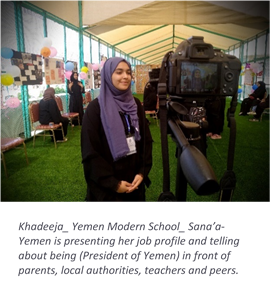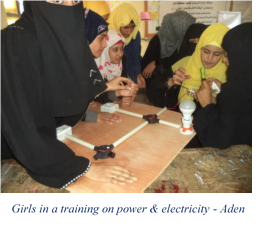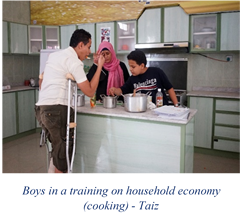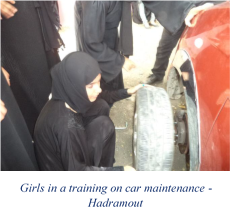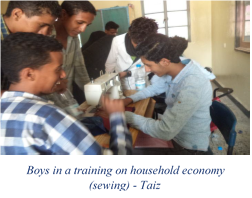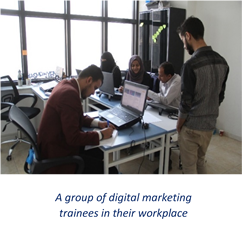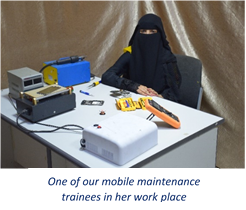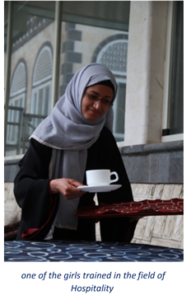GIZ Gender Competition 2020
The Youth Employability Improvement Program (YEIP) in Yemen is part of the Special Initiative on Stabilization in the Middle East and North Africa funded by German Federal Ministry for Economic Cooperation and Development (BMZ) and implemented by the Deutsche Gesellschaft für Internationale Zusammenarbeit (GIZ). The project aims at improving the employability of young adults of secondary school age from urban metropolitan areas in selected school districts in Sana’s, Taiz and Aden governorates.
The project is planned across three fields of activity (FoA) to increase the employability of young adults including FoA (1) on ‘Vocational and labour market orientation’, FoA (2) on ‘Introduction to vocational studies’, and FoA (3) on ‘Non-formal training activities at secondary schools’.
Across the world and especially in Yemen, women are still a long way off from achieving gender parity with men. Therefore, in Yemen and through GIZ- YEIP gender equality is considered a very important topic and there are many attempts and steps that were taken to assure the gender balance.
As the Yemeni society steps back in terms of gender equality. YEIP has made sure to make a difference and make the change for better future. Gender equality is a main principle for YEIP. It started since the early design of the project in a way to promote and contribute to the total gender equality in Yemen. YEIP has made it a golden opportunity for the Yemeni youth to open new horizons in their lives.
The following parts describe how each field of activity contributed to the total efforts through which YEIP is trying to make difference in the gender equality situation in Yemen.
Field of Activity (1): Vocational and labour market orientation
In this field of activity, the people with disabilities (PWDs) participated effectively and showed very good interaction during their participation. They were very pleased to have such opportunity of participation. They learned that there are no obstructions in life except those in minds. They also learned how to define their career options and find alternatives. YEIP hasn’t only invited them to participate but also made sure everybody has the same opportunities to participate in every aspect of activity to the best of their abilities and desires. Moreover, YEIP included them in everyday activities encouraging them to have roles like their peers who do not have a disability. YEIP facilitated and supported their field visits to the labor market in order to introduce themselves, break ice and fears and to be well oriented on opportunities.
It’s worth to mention that YEIP implemented these activities in partnership with schools and NGOs in order to contribute promoting PWDs equality and quality in the community. Moreover, to build capacities and highlight on gender issues.
Field of Activity (2): Introduction to vocational studies
This field of activity is about developing the vocational curriculum for the secondary school students, train the teachers on the curriculum, and pilot the curriculum in selected schools.
The vocational studies consist of six different fields of study: (Car Maintenance, Household Economy, Power & Electricity, Computer & Mobile Maintenance, Business Administration, and Entrepreneurship).
The challenge was that in a conservative society like Yemen, it is very difficult to convince parents of girl’s students that their daughters will study car maintenance or power & electricity as these subjects are stereotyped and saved for boys. In the same time, it is not acceptable socially that boys study household economy (cooking, Sewing, …etc.), and you can never find kitchen in all boy’s schools.
The curriculum was developed and offered to students both boys and girls, The training is designed to give awareness on how important for the boys and girls to be equipped with knowledge of basic skills in their lives, and YEIP saved no efforts to convey the message that youth need to learn, and that nothing is shamed in learning!.
It was expected that boys and girls would study only the subjects that they think are more fit and acceptable to them, while they would run away from other subjects. The training was given in different regions of Yemen including the most conservative part in a way to measure how families and students would react to the piloting.
The piloting is conducted in three governorates (Taiz, Aden, and Hadramout). In Hadramout which considered one of the most conservative governorates, the girls’ registration in schools was very slow, as families wouldn’t send their daughters to study car maintenance, or power and electricity. The registration period took longer time than the plan, as convincing parents and girls was not that easy.
The results exceeded all expectations. Students liked all subjects and many success stories are recorded. YEIP monitored the program step by step and noticed the increasing number of students in the program day after another.
Most of the students found the training valuable and deserved the time spent. The girls discovered that the fences the society put on their learning orientation and education path are not fair and should be removed.
Moreover, the offered training included also students with disabilities. Also, a group of deaf girls have been encouraged to participate, and a sign-language interpreter was hired to help them in schools.
Field of Activity (3): Non-formal training activities at secondary schools
In this field of activity, a numerous training programs were implemented in different fields such as Mobile Maintenance, Hotel Services, Hospitality, Solar energy maintenance, Digital Marketing, make up & Hair dressing, sewing, etc.…
Through these trainings YEIP made sure to provide equal opportunities for both genders and for persons with disabilities. Yet, doing so was not easy as through the implementation of those trainings YEIP faced several challenges.
In a total number of 416 of trained youth, 101 of them are women who were trained in different fields. In some fields it was not easy and was really challenging to target women such as in the fields of mobile maintenance, hospitality and restaurants services, hotel services and housekeeping.
In Mobile Maintenance training; A number of 8 girls were trained. There were challenges in many aspects; the first challenge was that this field is considered “Men’s field” and in Yemen only men do the maintenance of cell phones. The second challenge was linking the girls with the private sector as the maintenance shops were only designed for men, and in the Yemeni culture a girl can never work among men in cell phone shops. The third challenge was to find girls who are passionate and willing to participate in this training that ends with direct employment.
Another gender wise challenging field was hotel services and housekeeping, as in this field it was not easy to find girls for training and employment because of cultural reasons; in Yemen, a girl works in a hotel might cause a lot of talking about her. Still YEIP tried our best to include girls in this training by targeting NGOs that have database for girls to guarantee having a good number of girl applicants. Because of the hard situation in Yemen and as a result of our continuous work in creating a suitable work atmosphere for girls and in trying to help with destroying some of the cultural barriers , YEIP succeeded in training a total number of 9 girls in this field that ends with direct employment in the compound of and international organization and in one of the hotels in Yemen.
YEIP tried to approach these challenges by few steps, the first step was to have a meeting with the parents of the girls to make sure that they know what their girls are going to do, and that she is going to be trained in this chosen field and to talk to them about all the details of the work place, the working hours, the transportation, the atmosphere of work, to assure the parents about the nature of their daughters’ work.
The second step was to make sure that the work place has been adjusted and made suitable for girls by coordinating with the private sector by conducting a meeting with them and also by visiting the potential work place.
Also, and as mentioned earlier, to assure a good number of girls application YEIP try to go to humanitarian foundations that have database for girls who fit our targeted group (unemployed youth aged from 16- 25, school dropouts) who are looking for a job.
Furthermore, in one of our training programs in the field of motorbikes maintenance, YEIP tried to include persons with disabilities by targeting the handicapped foundation in Sana’a and ask them for recommendation of young youth who fit our targeted group and who would like to have a training in motorbikes maintenance.

 GIZ Gender Website
GIZ Gender Website